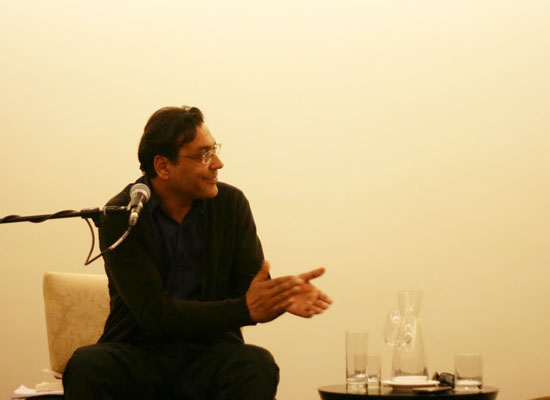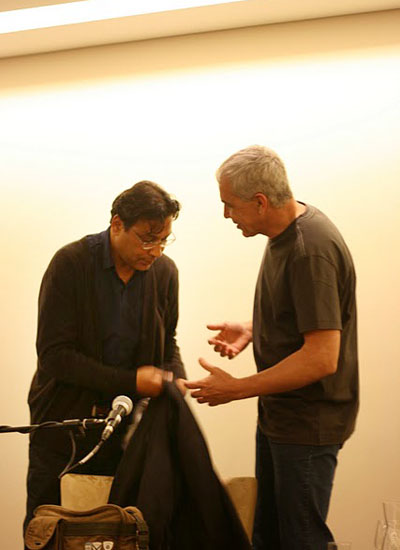EVENT: Leon de Kock launches Bad Sex (Friday 23 September; Townhouse Imbizo)
KAVISH CHETTY
Leon de Kock, author of Bad Sex, talks to Ashraf Jamal.
Part of the enduring largesse of psychoanalytic theory has been the discovery that we are not completely present to ourselves. There are dimensions and depths which belong to the umbral interior of the dynamic unconscious: inaccessible, unfathomable. Ashraf Jamal, lecturer of arts history and visual culture at Rhodes; and Leon de Kock, English professor at Stellenbosch University, riff excellently on this shadowed space and its constitutive powers, using De Kock’s Bad Sex as a literary cipher. Most enthralling about the seminar – other than, of course, both authors’ eloquence of dialogue – is the ability to connect private to public, to historicise and draw out protagonists and episodes as having a sociopolitical reference. The seminar is conducted alchemically with high-theory (French philosophers Deleuze and Gauttari) and comparative literary analysis (George Eliot, J.M. Coetzee): the consequences of De Kock’s novel are illuminatingly situated.

ANIMATED: Leon de Kock in conversation with Ashraf Jamal.
The speakers underscore that agents are firstly embodied and then embedded. But this notion of agency becomes the embattled terrain, skirmished over through the talk. “Reason seems delusory and futile,” remarks Ashraf of conscious forces. “Error is dominant,” De Kock responds on how Bad Sex’s protagonist, Sammy Baptista, encounters something which changes his “axis of perception”. “Because of our selective entry into consciousness, the way we perceive, from an angled vector, this great morass of what is known as reality, it is inevitable that we are going to stumble into error.” This alludes to the theme of an inescapable history in Bad Sex: formative qualities are repressed and forever lurking. Their threat is their possibility of trigger, like a lifelong revolver cocked against the cerebellum. In Bad Sex this quieted threat is both personal and political (the intrusion of Apartheid, black/white relationships, male/female affairs). And it is not consigned to a static role. The embedded quality of the subject must take into account the wider economy of a regulatory desire. De Kock’s “brain, groin and gut” trio is a coded phrase for tensions between ego, id and superego. He speaks of “willing the world into being”, saying, “Your own mortality, sense of ethics, internalisation of other systems in the world, come to a mashing resolution in the gut, in the collisions of experience. Doing contradicts and renders null and void that which you are desiring to be. We shape our reality according to our desire.”
Desire is integral to life under the sign of late capitalism, and De Kock speaks of its colonisation by consumerist dogmas. Unlike all antecedent epochs, we have an unrepentant sense of an “entitlement to happiness”. We want multiple orgasms, not simply a singular burst of jouissance. An endlessly deferred, unquenchable desire animates the capitalist logic. The authors speak here of a consumerism of sex, a corporatism of happiness. Jamal mentions “the corporate moment of excess, superfluity, abundance, anomie and anarchy: an excessiveness which informs the ‘I want’”. He says, “21st-century people are more inarticulate than we’ve ever been – not stupid – just losing our capacity to compute what we effectively are and do – and [this] book is precisely the symptom of that breakdown, this misprision, a synapse. We can’t understand what’s going on, but things are driving us, desire is moving us. We don’t know why because we’ve lost the capacity to have a reigning consciousness. Excess becomes dominant, and it’s thematic of the nature of global consumption.”
Bad Sex contours these themes through the confessions of Baptista’s raw youth, discovering the edges of masculinity, learning of its uncrossable thresholds which meet in Mayfair violence. The struggle is against the code which marks him as “male”, the historical sediment which accretes during the longue durée giving to us the world and its unstable orders. Cast against the voltage by which this world sculpts, Baptista clings to the rational, an ungraspable definable core, the will to designate his own parameters, repeating “I will not be reformed. Non serviam.” This is the contradiction of modernity. In the phrase of postcolonial scholar Dilip Gaonkar: “To dwell and grapple with that twin matrix of change and routine in which the modern self is made and unmade.”

AFFIRMING: Ashraf Jamal closes off his interview with Leon de Kock.
Jamal once comically referred to South African literature as “a dog chained to its own vomit”. He alludes by this to a banality of our literature: it “unfolds its narrative pathologically.” He says, “It has a retrograde, depressive, regressive need to hold onto something wrong in order to create a correction.” He admits that this is an element of De Kock’s “therapeutic fiction”. But he argues the novel transcends merely this. Drawing from Coetzee’s Summertime, he says, “The pursuit of nothingness moves us beyond the good and bad, into some other domain, freeing us from the tyranny of identities, knowledge systems which bind us, imprison us: gulags. What this book is surging towards is trying to break the pathological mainframe which informs the nature of writing about societies, histories, cultures and sex in this country.”
De Kock’s novel offers a galvanic stimulus to think and rethink the themes above. The discourse offered by these two authors accomplishes the central task of criticism: to expand the logics of comprehension by which we make sense of cultural artefacts; to seek out their connections and convergences, offer interpretations which enable rather than frustrate. The seminar was charged, agile, committed: a perfectly complementary and complimentary enlargement of the psychosexual vortices suggested by Bad Sex.

FINAL COMMENTS: Leon de Kock and Ashraf Jamal share a moment after the interview.
 SLiPStellenbosch Literary Project
SLiPStellenbosch Literary Project